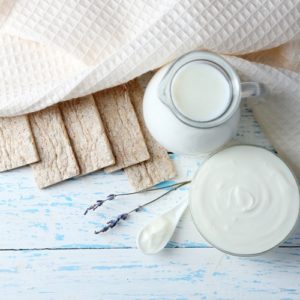As an Austin culinary arts student, you have access to the freshest ingredients both inside and outside the classroom. But ingredients don’t always stay fresh. It’s happened to everyone before: Whether you’re baking a cake or simply getting milk for your cereal, you go to the refrigerator to grab the ingredient, but something about the smell seems off. You think it may have gone bad, but the expiration date says it is fine. So what do you do? Here’s how to tell when to ditch your dairy:
Tech to transform the kitchen
How do you know if a product is fresh enough to use it for your meal? Well, the answer may be easier than you think. Teams from the University of California, Berkeley and National Chiao Tung University in Taiwan are in the process of creating 3-D printed “smart caps.” These are intelligent lids that sense bacterial levels in containers. The caps will have tiny electronic components that track decomposition. Ideally, the milk carton will splash enough of its contents onto the cap that the device can detect bacterial levels. That will provide you a reading to see if the product has gone bad. After the initial testing, the team concluded that the results tests show that these devices can start a whole new class of kitchen technology. Results of the study are published in the journal Microsystems and Nanoengineering.
Not only could these caps prevent potential health issues, they could also help lower the amount of food the average American consumer throws out. Expiration dates are safety dates, meaning if you cannot use a food before this date, you should either freeze it or throw it away. However, the best-used-by dates are a little more ambiguous. They reference how long a food product will remain at its peak quality and freshness. Most foods are generally safe to consume after this date, but according to Simmer and Boil, studies have shown that 51 percent of consumers throw away food after this date.
But there are always extenuating circumstances. Sometimes food or drinks are left out on the counter for an unknown amount of time or your refrigerator breaks, leaving you unsure what is safe to consume. This new development could clear the air for safe milk consumption.
When to ditch the dairy
Though this device could be an extraordinary help in the kitchen, it is still in the process of being created. That means it’s still up to the consumer to determine if dairy is bad or not. Here are the old-fashioned ways to know if you should throw away your dairy product:
If your dairy has gone bad, it usually becomes chunky and develops a strong, sometimes sour odor. The odor will vary depending on the product, but it should smell different than it did before. A small tip that could help you in the long run is to know the scent of your dairy product before. That way, you’ll know if it smells “off” or when to question the freshness. Because bacteria grows more easily in warmer environments, keep your dairy cool. If you’ve purchased milk at the grocery store, try to not take any long detours home, or invest in a bag that preserves the cold temperature.




